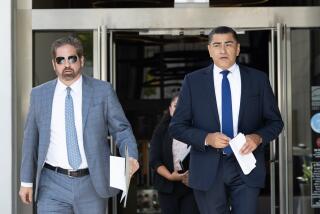Court Voids L.A. Use of Federal Secrecy Laws to Kill JDL Suit
A novel attempt by the City of Los Angeles to end a Jewish Defense League lawsuit against police officials on grounds of national security was turned down Monday by a state Court of Appeal.
In a 49-page opinion rejecting the first attempt to apply federal secrecy privileges to state courts, the 2nd District Court of Appeal reinstated the civil suit. The justices also ordered the trial court to reconsider whether city lawyers should answer questions about Larry Winston’s status as an officer of the Los Angeles Police Department and its defunct Public Disorder Intelligence Division or successor Anti-Terrorist Division.
The suit, which seeks monetary damages and an injunction to prevent abuse by police intelligence officers, claims that Winston, using the name Joel Cohen, was a police intelligence officer who infiltrated the JDL between 1979 and 1984 and unsuccessfully tried to goad the group into commiting violent acts, such as bombing the Rev. Jesse Jackson’s presidential campaign office on Wilshire Boulevard.
The suit also claims that Winston and the Police Department violated guidelines approved in a $1.8-million settlement of suits by 144 groups and individuals against the police intelligence unit in 1984. The guidelines state that undercover intelligence officers cannot assume leadership in an organization or “cause dissention within an organization or incite unlawful activity by any individual or organization.”
Decline to Answer
Attempting in a state court to apply federal law permitting federal government agencies to decline to answer questions on grounds of endangering national security, city lawyers had argued that the case should be dismissed because they could not confirm or deny the JDL’s claims without significantly compromising local, national and international law enforcement.
In granting the dismissal after a monthlong, closed-door hearing two years ago, Santa Monica Superior Court Judge David M. Rothman said: “I find by the overwhelming weight of the evidence that the maintenance of this litigation is contrary to the public interest because it would necessitate disclosure of clearly privileged information and significantly compromise not only local but national and international law enforcement.”
But the appellate justices, in an opinion written by Justice Leon Thompson, with the concurrence of Justice Earl Johnson and Los Angeles Superior Court Judge John L. Cole, sitting by special appointment, said no law exists authorizing such action and that the court could not simply create a local state secrets privilege that would thwart a lawsuit.
‘New Means’
“We cannot, on the basis of the record before us, accede to the city’s request to create a new means of achieving the drastic remedy of dismissal without any justification under statutory or decisional law,” Thompson wrote.
Assistant Los Angeles City Atty. Lewis N. Unger, when informed of the ruling, said he was “obviously disappointed” but would have to read and evaluate the opinion before deciding whether to appeal the case to the California Supreme Court.
Joan W. Howarth, one of the American Civil Liberties Union attorneys handling appeals of the suit for the JDL, greeted the ruling as “an important vindication of the principle of open courts.”
More to Read
Sign up for Essential California
The most important California stories and recommendations in your inbox every morning.
You may occasionally receive promotional content from the Los Angeles Times.










